The Common Synod of the Hungarian Reformed Church met on the 13-14th July, 2023. During the two-day meeting, the constitutional amendment was voted on, allowing the Federation of Hungarian-Speaking Protestant Congregations in Western Europe and the Hungarian Reformed Pastoral Service in Western Europe to join the Hungarian Reformed Church. In addition to expanding the membership, the Hungarian Reformed National Strategy for the Carpathian Basin and the closing statement of the Synod were adopted.
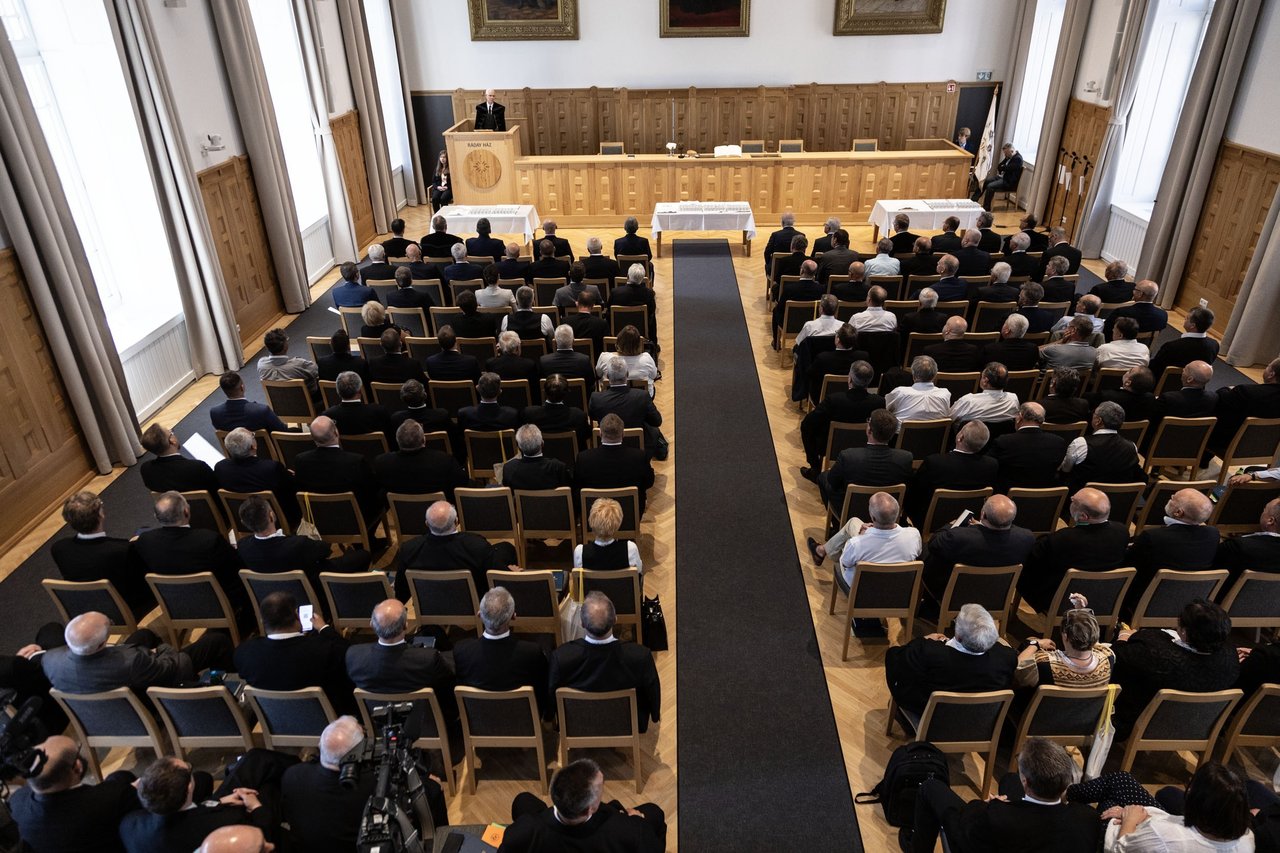
At the event's opening on Thursday, Zoltán Balog, Ministerial President of the Synod of the Reformed Church in Hungary and Bishop of the Danubian Church District, welcomed the members and guests. As is customary, the host introduced the first day of the Synod, this year, the Danubian Church District.
"Let there be light" (Genesis 1:3) - Zoltán Balog began his introduction with the motto of the district. He stressed that to be truly light, we must run again and again. “How good it is to experience this when there is light in the heart of man, which, according to biblical anthropology, is not simply the centre of romantic emotions, but the unity of reason, emotion, and will. We want that light to fill our lives, communities, and hearts. However, we have to struggle for this light because it is not our possession, but the Word of God gives it to us, so we have to pray for it again and again," he explained.
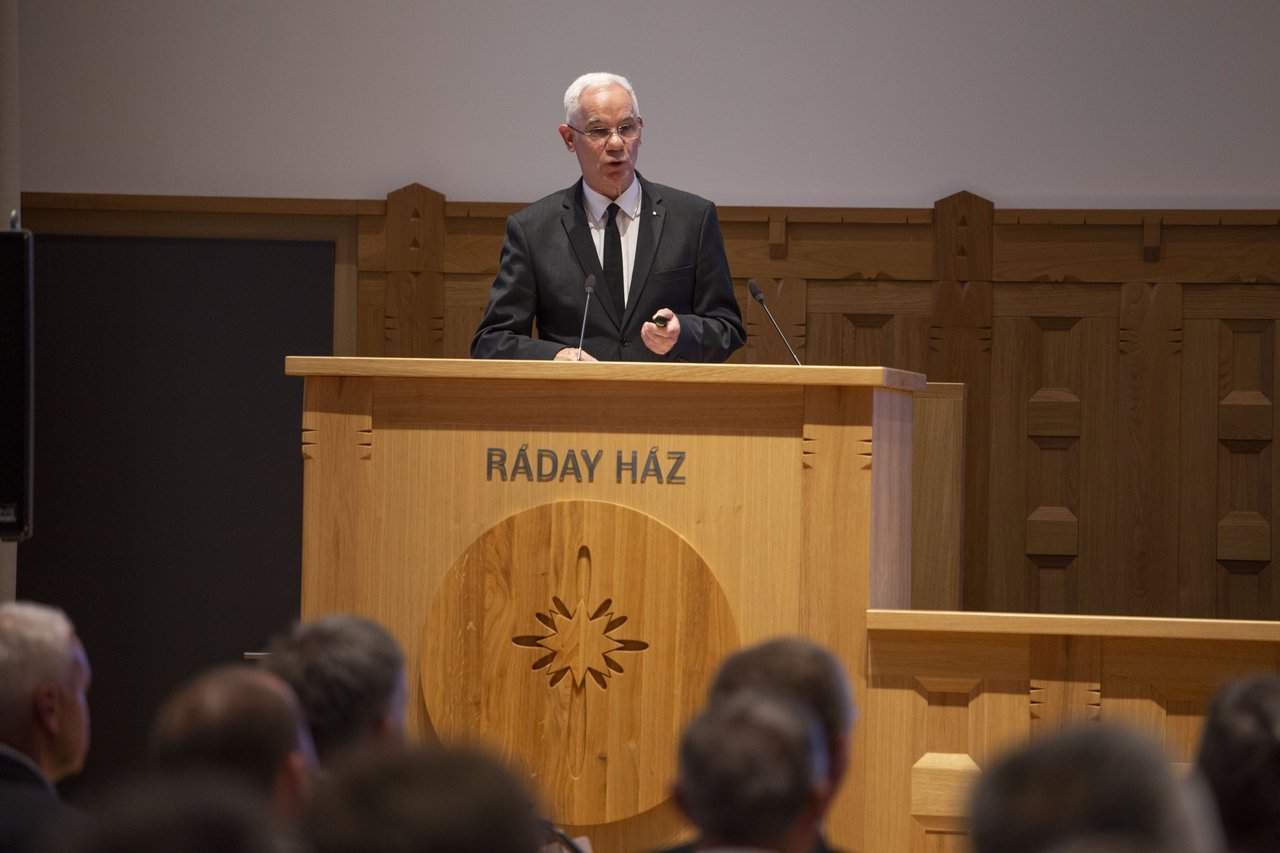
Zoltán Balog, Ministerial President of the Synod of the Reformed Church in Hungary, Bishop of the Danubian Church District
The bishop then presented the history of the Danubian Church District, whose official foundation dates back to the 16th century, and spoke about the district’s earlier bishops of great importance, such as István Kis Szegedi, Pál Török and László Ravasz. The bishop then presented the district’s organisational structure, institutions, and services. In particular, he highlighted the creation of care parishes, which bring together the smaller, dwindling congregations in the outlying areas. He highlighted the history of the event venue, the Ráday House, which had been destroyed by fire and had to be rebuilt entirely. The details were presented by the lay president of the church district, Sándor Veres, with the help of a video summarising the process from the burning of the building to the handing over of the new building.
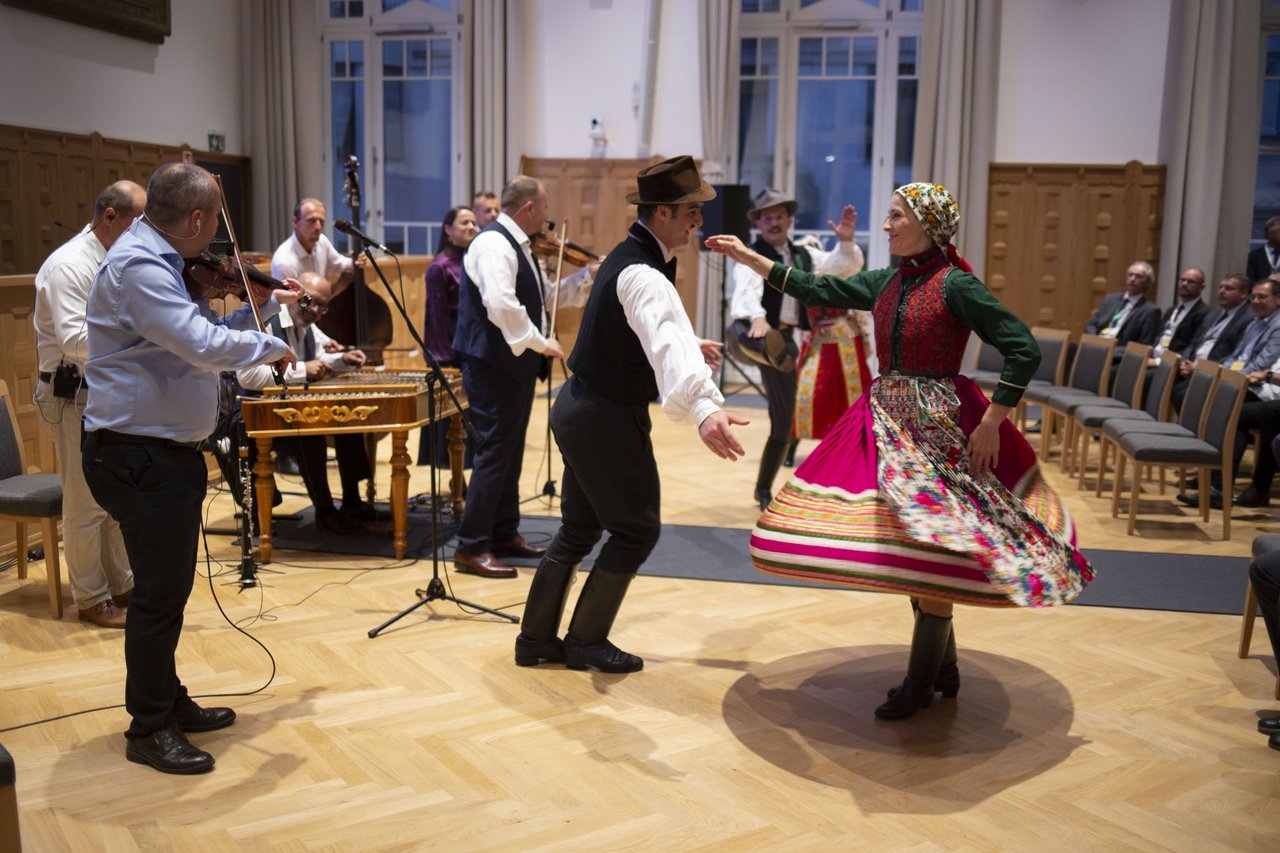
The synod members and guests were treated to a joint performance by the descendant of a Transcarpathian Reformed presbyter and the Liszt and Kossuth Prize winner, István Pál Szalonna and his band, and dancers from the Hungarian State Folk Ensemble to close the opening day.
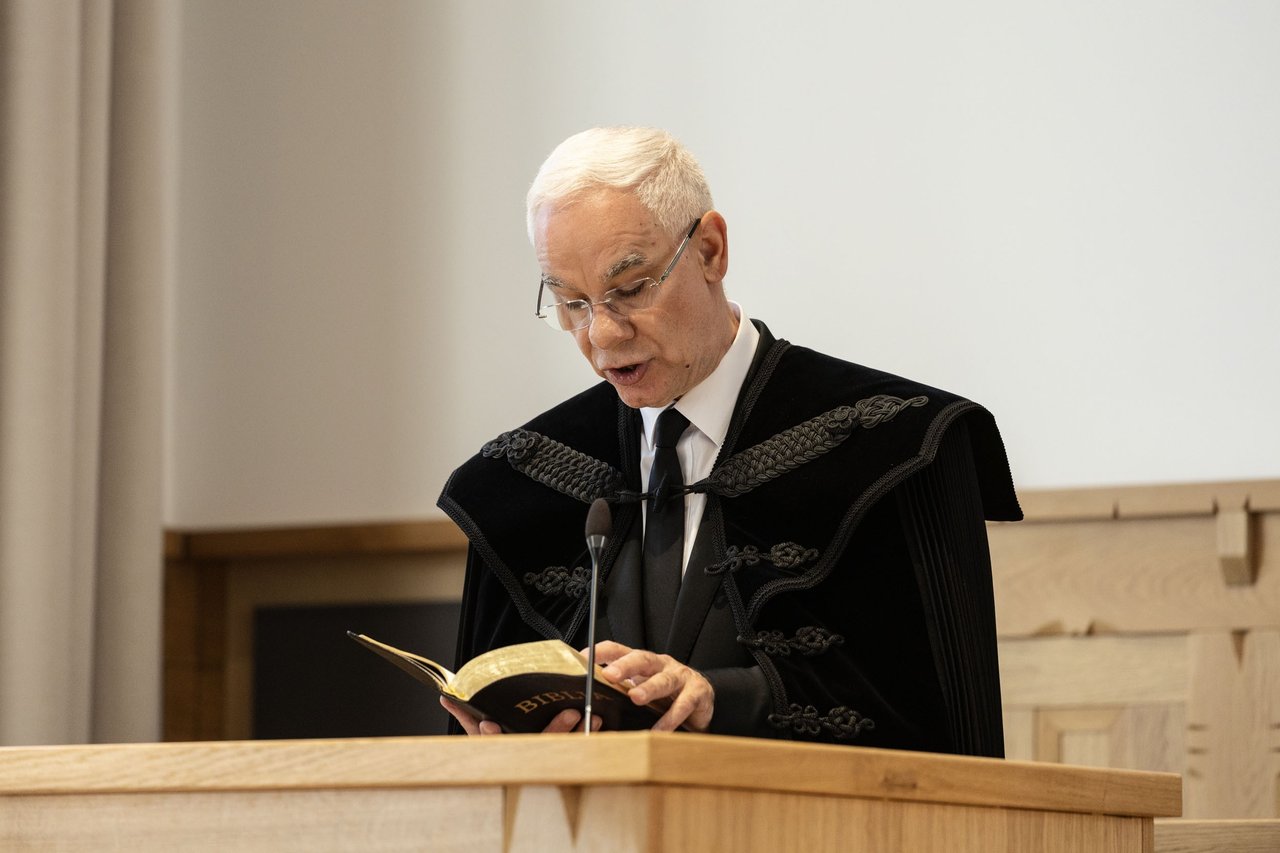
Bishop Zoltán Balog
The second day of the Common Synod of the Hungarian Reformed Church began with a communion service. Zoltán Balog, Bishop of the Danubian Church District, preached the Word and read the passage of the Bible reading guide from chapter 4 of Paul's first letter to Timothy.
"For everything God created is good, and nothing is to be rejected if it is received with thanksgiving, because it is consecrated by the word of God and prayer. If you point these things out to the brothers and sisters, you will be a good minister of Christ Jesus, nourished on the truths of the faith and of the good teaching that you have followed. Have nothing to do with godless myths and old wives’ tales; rather, train yourself to be godly. For physical training is of some value, but godliness has value for all things, holding promise for both the present life and the life to come. This is a trustworthy saying that deserves full acceptance. That is why we labor and strive, because we have put our hope in the living God, who is the Savior of all people, and especially of those who believe. Command and teach these things." (1Timothy 4,4–11)
At the beginning of his sermon, Zoltán Balog reminded the audience of the great need for straightforward speech. “We are helped in this by the daily Word, which we do not choose; we cannot say it is for someone else. If we read it, it would be good to recognize the power of being in communion with our Reformed brothers and sisters from Miercurea Ciuc (Romania) to Cleveland. Our contexts and situations in life may be different, but the text is the same," he stressed. He said it is a beautiful task and a challenge to seek a common understanding of it, showing Reformed unity in the whole world. He also explained that speaking frankly is not the same as speaking harshly but means being able to call truth and reality by name. It was a matter of habitus when the letter to Timothy addressed the second generation of persecuted Christians, so accepting the truth was a matter of life. As the passage reads, all God's creation is good if sanctified. To give us the correct answers to this question of existence, the apostle gives us the tools, which is why he says that all God's creation is good if it is sanctified. And the way to do this is through prayer and the Word of God," he pointed out.
In addition, the apostle also draws attention to the appearance of distractions in the form of unholiness: "There have always been, and there will always be, those who clamp down on what is untouchable, who seek to defile what we believe in. In the face of these dangers, the apostle also offers the remedy: piety, godliness, and reverence for the God who creates and saves. We know who is our companion and our helper in this: Jesus Christ, and our means are prayer and the Word," he stressed. The bishop said that in straight talk, the Reformed Church is not so bad, they name the truth and the pure, but if they do not point out the filth and sin, they are only half right.
Zoltán Balog stated that the threat to Hungarian Reformed life is being experienced repeatedly. “If we think we are safe, let us cross the border into Ukraine,” he suggested. The real threat comes from within. "Do not fear those who kill the body but cannot kill the soul. Rather, fear him who can destroy both soul and body in the fire," he quoted from Matthew 10:28. Finally, he pointed out that Reformed Christians are a "people of the Scriptures." Still, they must also be a people of prayer because, without divine guidance, Scripture is worthless.“The revival of the letter is God's privilege so that without it we do not want to understand it, without it we do not want to live our lives, without it we do not want to make decisions to remain in it," the bishop concluded.
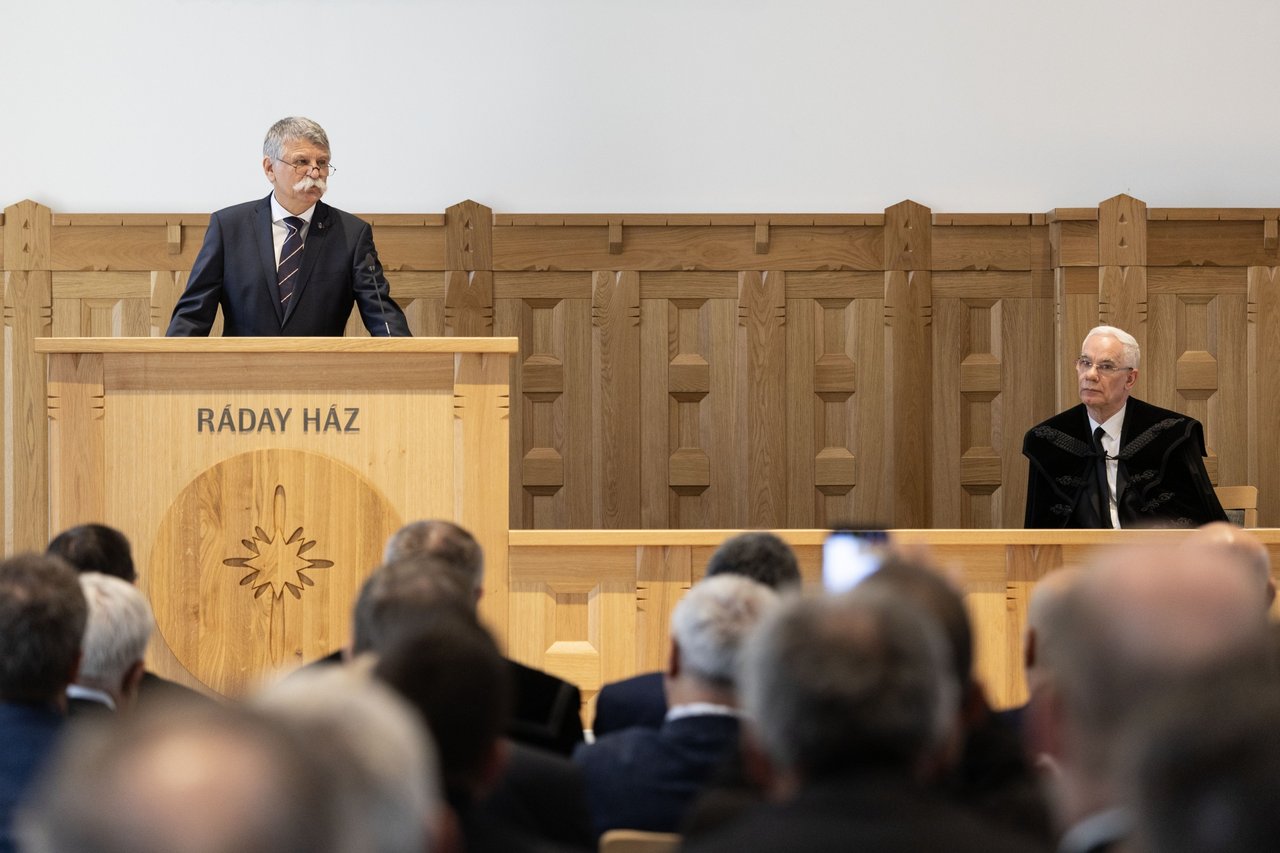
László Kövér, Speaker of the Parliament
Afterward, László Kövér, Speaker of the Parliament, spoke about the political and cultural situation in Europe. He stressed that the existence and cohesion of the Hungarian nation is not simply a historical gift or formation but part of the plan of Providence. Therefore this national existence has a meaning and purpose that goes beyond itself. He explained that the purpose of the 16th-century Hungarian Reformation was to save the Hungarian nation from disintegration and destruction. The preachers of the time preached the gospel with renewed vigour, not only concerned for the individual salvation of the poor, persecuted Hungarians but for the conversion of the whole Hungarian nation so that God might have mercy on us all. "Pity, O Lord, the Hungarians, who are tossed by waves of danger...!" Kövér quoted the National Anthem of Hungary.
“Even if not as the first Hungarian reformers imagined, we have survived. The Hungarian-language Bible is not only one of the sources of our national language and culture, but it is also the common treasure and shared value of all Hungarian Christians and Christians,” he added. "You will do the most for the Hungarian nation of today and the Hungarian nation of the coming centuries if you present this common foundation and common value in the 21st century as not an outdated moral relic but as a guarantee of the survival of Hungarian Christians,” László Kövér addressed the audience. Finally, he noted that he was pleased to read in the Hungarian Reformed National Strategy that the Hungarian Reformed Church takes this mission seriously.
Sándor Veres, lay president of the Danubian Church District, in his welcome speech on behalf of the Presidium of his church district, pointed out that Hungarian Reformed Churches have always maintained their unity in faith and theology despite the forced fragmentation. He drew attention to the need to proclaim the Gospel in an age of wars and deceit: "Let us speak the truth and reality; it is not God's word that has weakened, but our own. The situation in which Christianity finds itself seems humanly impossible, but that is why God has sent His Holy Spirit to make something good out of the impossible. This is grace," concluded Sándor Veres.
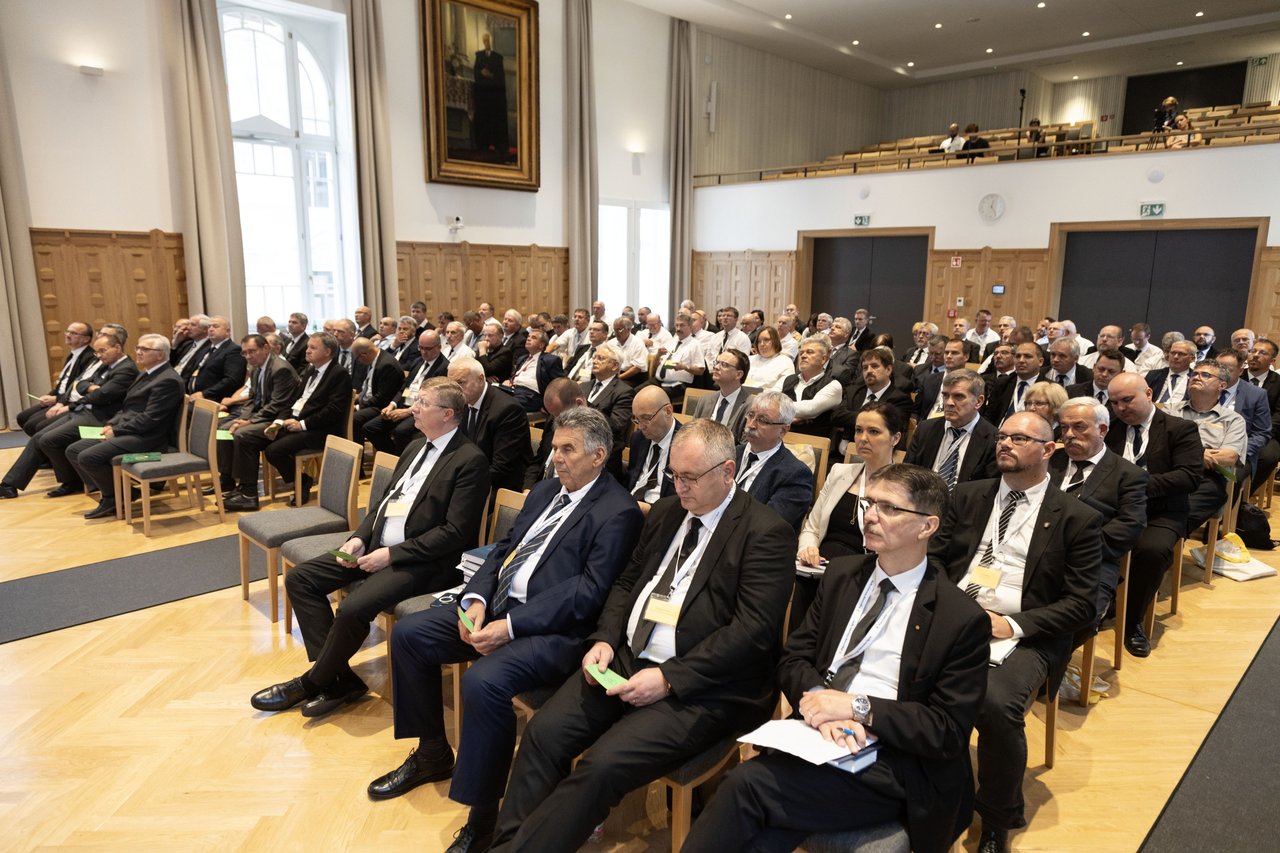
In his report as the President of the General Convention, Bishop Zoltán Balog drew attention to the political events in the world, pointing out that in the cradle of Christianity, there will soon be no believers because their communities are being exterminated and driven away. Soon there will be no one to pray in the language of Christ. The bishop also spoke of Transcarpathia, where one of the most enduring Hungarian Reformed communities in faith and national consciousness is under attack. Concerning the war in Ukraine, no matter the outcome, the bishop said, there will be dire consequences for the Hungarian community in Ukraine. He emphasized the help coming from both the West and the East since there are and have been supporters from everywhere, from America to Korea, who help Hungarians in Transcarpathia through the Hungarian Reformed Church Aid - thanks to which the survival and functioning of the communities there can be ensured, at least in part. Not a single Hungarian Reformed pastor has left Transcarpathia, he said. Zoltán Balog is convinced that we must pray for a just peace to reach an agreement that will allow for a just government in the future.
He then recalled the unification in 2009, when the Hungarian Reformed Church was established, and expressed his gratitude to those who never gave up the hope of unification. Zoltán Balog then listed the most important events in the Church since the 2019 Common Synod. He concluded by saying that it was good to talk about Hungarian Reformed unity because, though we are all over the world, we belong together everywhere. The bishop concluded that togetherness is fundamentally a gift of God's grace.
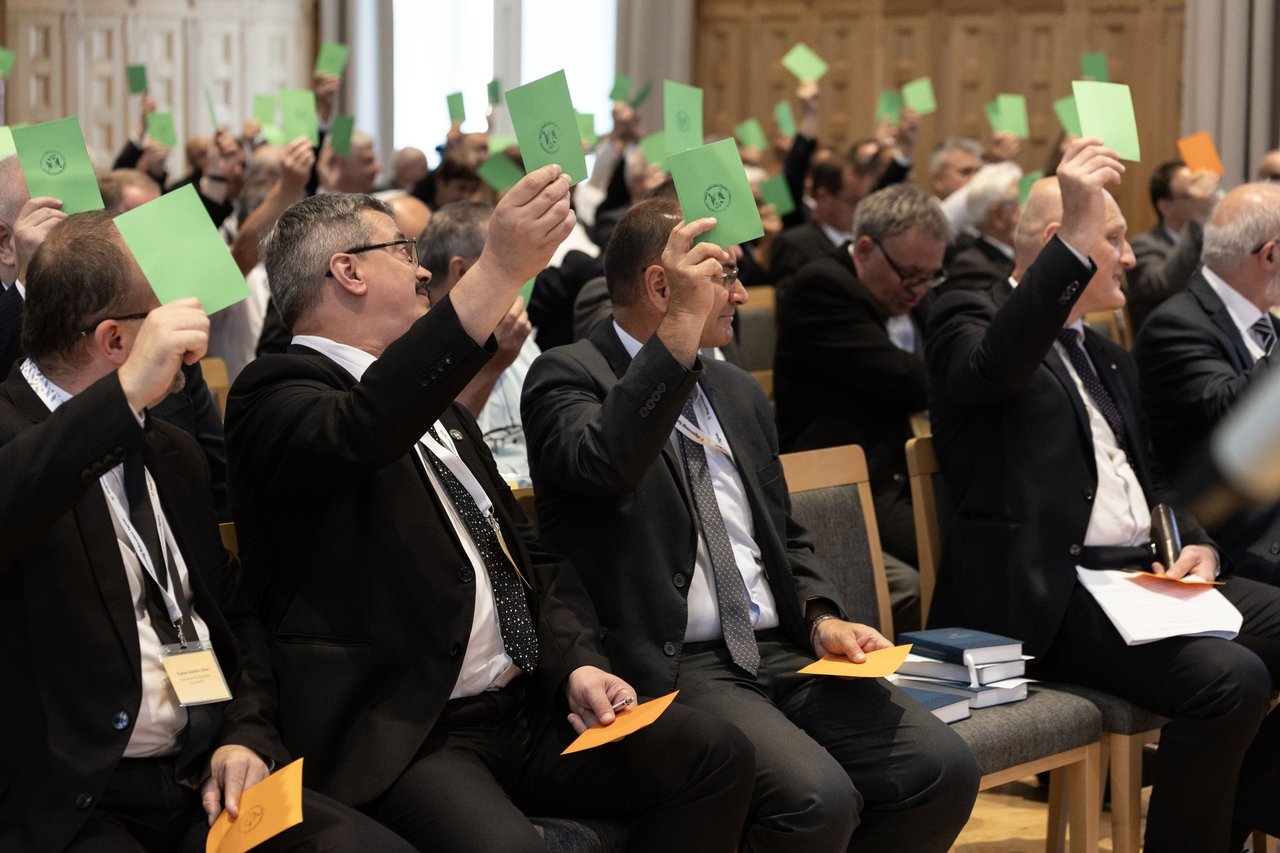
One of the most important points of the synod's programme was the reform of the membership of the Hungarian Reformed Church. Loránt Rákos, deputy bishop of the Reformed Christian Church in Slovakia, presented the plan for the necessary constitutional amendment, which will create three categories of membership:
Those national Reformed churches and districts in the Carpathian Basin separated from each other as a result of the Trianon peace dictate, but in 2009, confirmed their unity based on a common creed and identity and entered into synodal unity with each other, adopting the Common Constitution of the Hungarian Reformed Church. They have a constituent membership in the Common Synod of the Hungarian Reformed Church and are also members of the General Convention.
Associated churches are those churches or congregations which have joined the Hungarian Reformed Church through one of the churches of the Carpathian Basin and have thus received synodal seats from the churches which have granted them membership. They are also members of the Common Synod of the Hungarian Reformed Church but can only participate in the General Convention in a consultative capacity. It should be noted here that as a result of the amendment, the first and second categories will become closed, and no further members will be admitted. As a consequence, the number of synod seats will also be increased, as those sub-churches in the Carpathian Basin which previously ceded synod seats to associated sub-churches will get those seats back, and those in the second category will be given independent seats in the Common Synod of the Hungarian Reformed Church.
The category of Associate Community Member will include any Reformed Church, ecclesiastical body, or association of congregations applying for membership after the adoption of the membership reform, which, on the basis of its confessional and linguistic identity, is willing and able to enter into at least faith and spiritual unity with the Hungarian Reformed Church. It is essential that they may participate in the Common Synod of the Hungarian Reformed Church with one voting representative.
The wording of the Constitution has been adapted to the new categories, as appropriate, and the concept of "community of faith" has been introduced, which intends to express the theological membership of the associated community. The assembly adopted the constitutional amendment, bringing the membership of the Common Synod of the Hungarian Reformed Church to 126, and the two new members subsequently admitted brought the total to 128.
Following the vote on the constitutional amendment, the representatives of the Federation of Hungarian-Speaking Protestant Congregations in Western Europe (NYEMPGYSZ) and the Hungarian Reformed Pastoral Service in Western Europe (NYEMRLSZ) signed the declaration of accession.
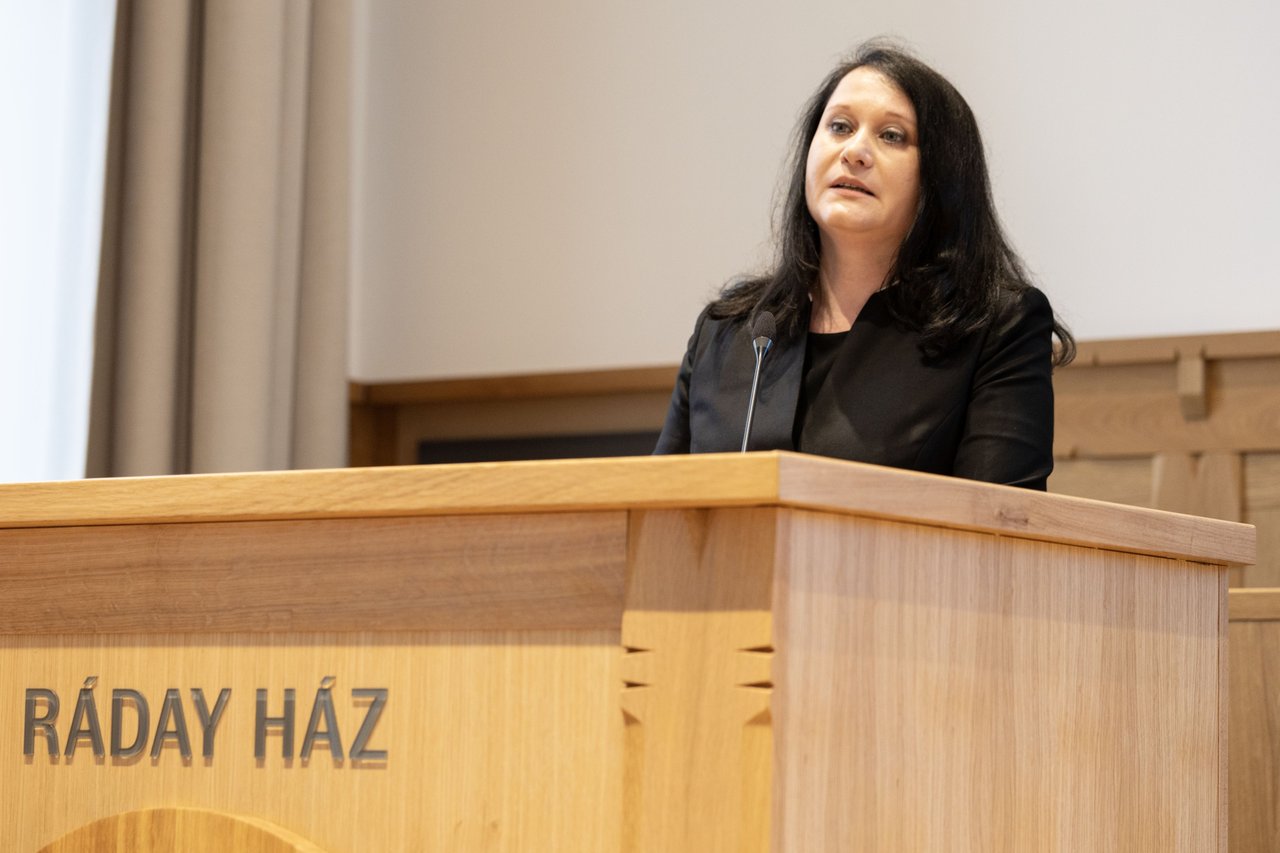
Mónika Karvanszky, President of the Federation of Hungarian-Speaking Protestant Congregations in Western Europe
In her welcoming speech, Mónika Karvanszky, President of NYEMPGYSZ, said that they had been waiting for this moment for a long time. Recalling the thoughts of her predecessor, she drew attention to the parable of the good shepherd who left behind the ninety-nine for the one who was lost. “We have the right to invoke this Christian teaching but not the right to consider ourselves worthy of this grace," she said. Finally, she expressed her thanks for the fact that the formal accession had sealed the existing communion.
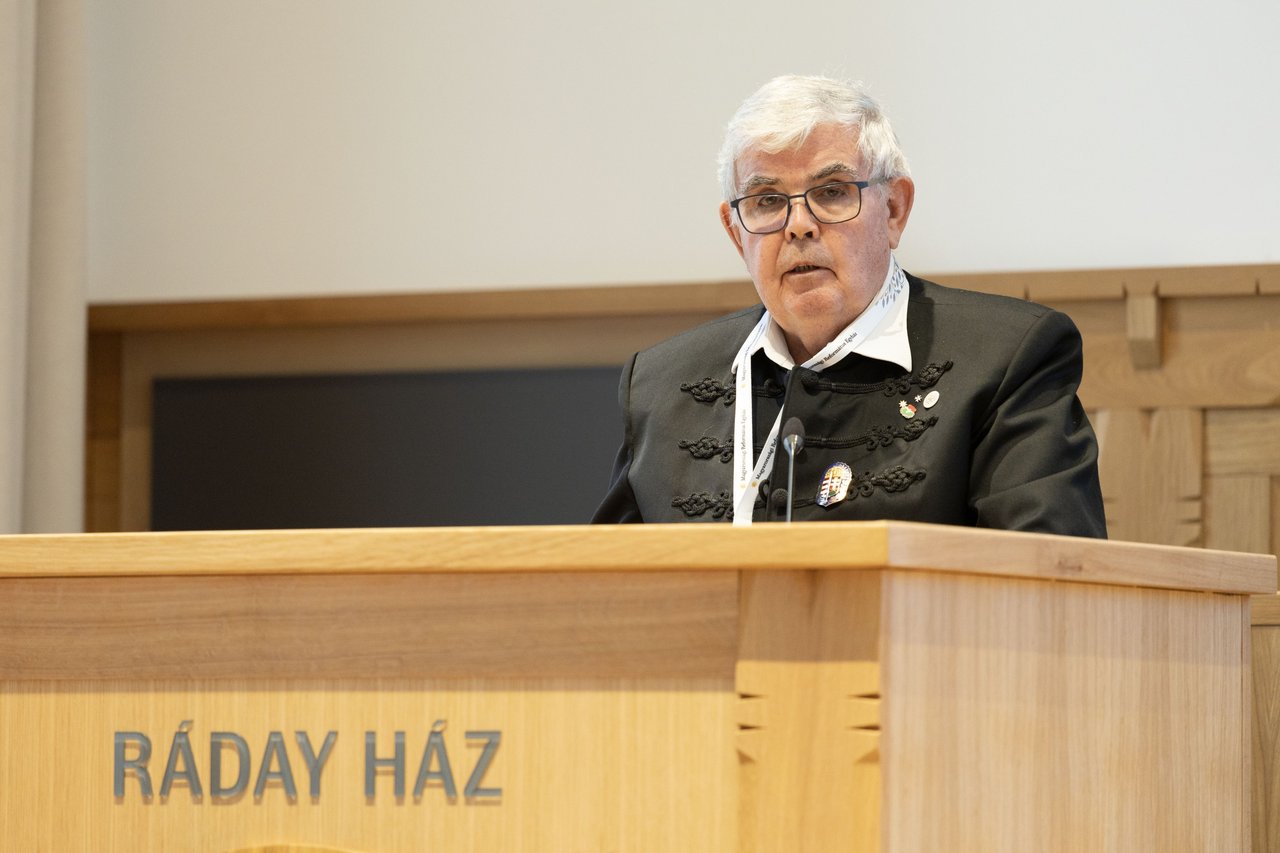
Albert N. Békássy, lay president of the Hungarian Reformed Pastoral Service in Western Europe
In his welcome speech, Albert N. Békássy, lay president of the NYEMRLSZ, stressed that the glory of God was realized on this day, as the reintegration process, which had been advocated since the 1980s, had reached its goal. He explained that their story began in 1944, when Bishop László Ravasz sent out, among others, Sándor Nagy and his companions to care for the one and a half million people who had fled to the West at the end of the Second World War. Later, in 1957, their organisational autonomy led to their excommunication, he explained. He thanked them for being "embraced by the big brother in the motherland.” “We believe that it is worthwhile to remain Hungarian in any part of the world," the President concluded.
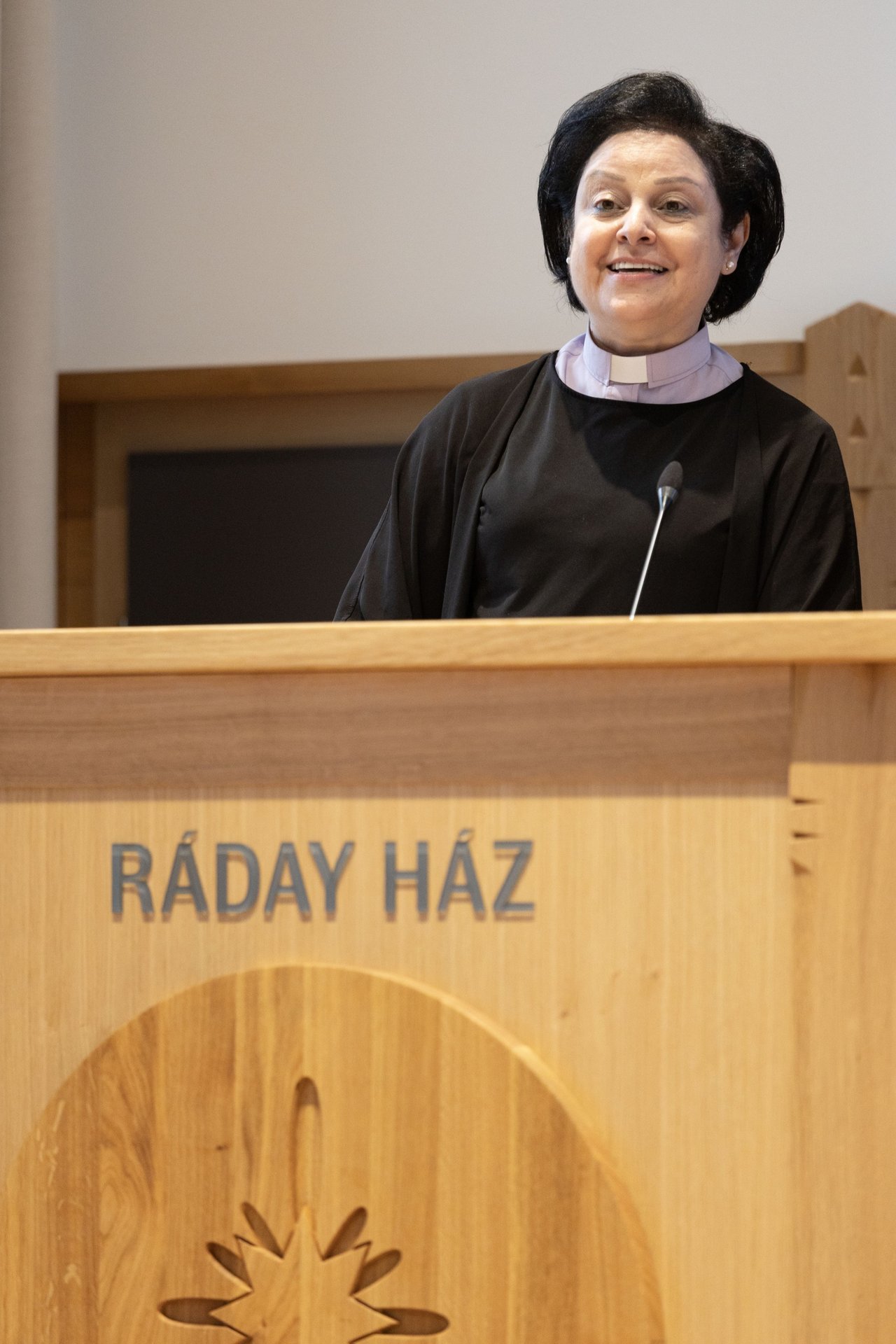
Najla Kassab, President of the World Communion of Reformed Churches
After the lunch break, the guests of the Synod welcomed the participants. Najla Kassab, President of the World Communion of Reformed Churches, said that it was a pleasure and an honour to be here despite the challenges facing Reformed communities today. “Our challenge today is to be a relevant church that impacts the world and dares to make its prophetic voice heard publicly," she explained. The pandemic and the war in Ukraine have also challenged us to address injustice and be a church connecting directly to people's suffering. To serve refugees and protect the dignity of people," said Najla Kassab.
She stressed that these are difficult days but also days of kairos, of qualified time, when God intervenes and shapes us in new ways, a time without beginning or end, without limits, a time of imagination that cannot be controlled or owned. She pointed out that for the Hungarian Reformed Church, this day is a celebration that should give hope as we celebrate joining two communities. “In God, being a minority is not synonymous with weakness or despondency but rather with a call to a role that can shape the lives of many, no matter how many of us there are. A call to be a light in a broken world," said the President of the World Communion of Reformed Churches.
Kassab was to have been followed at the podium by Semko Koroza, Bishop of the Polish Reformed Church, who could not board his plane for technical reasons and did not arrive for theSynod. A colleague, therefore, delivered his welcoming address. He said that the Reformed community in Poland was a minority, and the country was essentially Catholic. However, the bishop said it had now become more of a "country of non-believers." The speech also revealed how Poles had come together to help refugees from Ukraine. This experience strengthened the bishop's appreciation of genuine communities, like the one in Hungary.
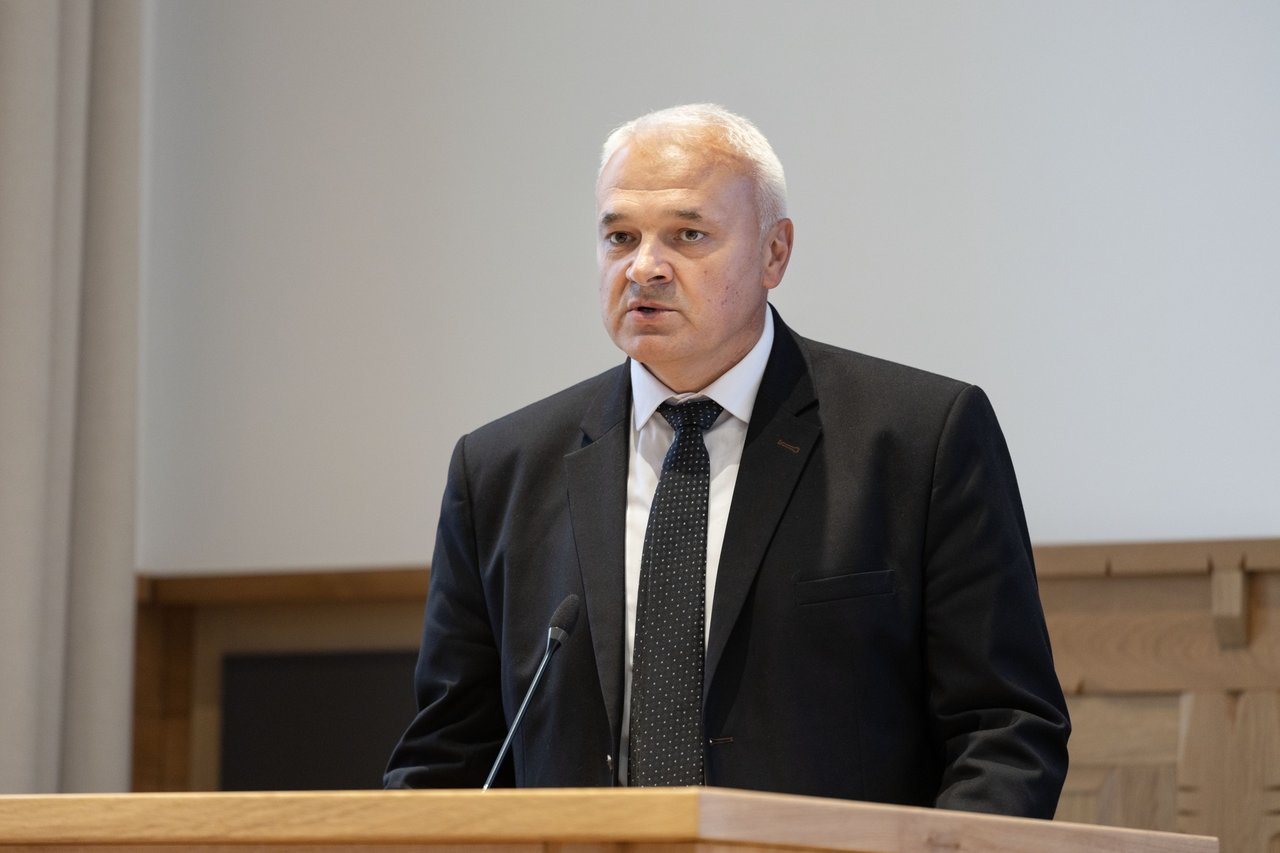
Sándor Zán-Fábián, Bishop of the Transcarpathian Reformed Church
As the Synod drew to a close, Sándor Zán-Fábián, Bishop of the Transcarpathian Reformed Church, reported on the situation in their community. The Reformed Church in Transcarpathia has proclaimed 2023 the Year of Hope, and the theme hymn chosen from Job chapter 14. "Even a tree has hope: if it is cut down, it will grow again, and its shoots will not fail. Though its roots grow old in the ground, though its stump dies in the dust, yet it shall spring up by the smell of the water and bring forth branches like the sapling." (Job 14:7-9)
The bishop pointed out that their church will be 100 years old this year, so the passage of the word chosen refers not only to the war but also to the past century, during which the Hungarian Reformed living there have not spent a single year in freedom and peace. In the current situation, he continued, it is that gratitude and hope override fear, dread, and hopelessness. They expressed their appreciation for their staff, who have been preaching the Gospel since the change of regime, and for their educational institutions, which have provided in-person education throughout the year. After the outbreak of the war, only those who had shelters could do so. The Reformed institutions did not have such shelters, but in any case, they could rent or set one up, partly with the support of the Hungarian Reformed Church Aid.
“To those who wanted to leave, I told them that this is a community where if one link breaks, the whole thing breaks up," said Sándor Zán-Fábián. They understood this, and everyone stayed, thanks to the support and solidarity shown towards them. He singled out the Reformed people of Transylvania, who support elderly care and home care services. The Királyhágómellék Church District in Romania has donated 35 million forints to them. And churches in Croatia and Serbia are helping to fund care for children with special needs. He thanked the Hungarian reformed churches in Slovakia for supporting summer camps and said many people only want to support refugees. They had been promised support through a German friend but had not yet received it because it turned out that they wanted to use it for camps for confirmands. "It is often harder to stay at home than to be a refugee," stressed Bishop Zán-Fábián.
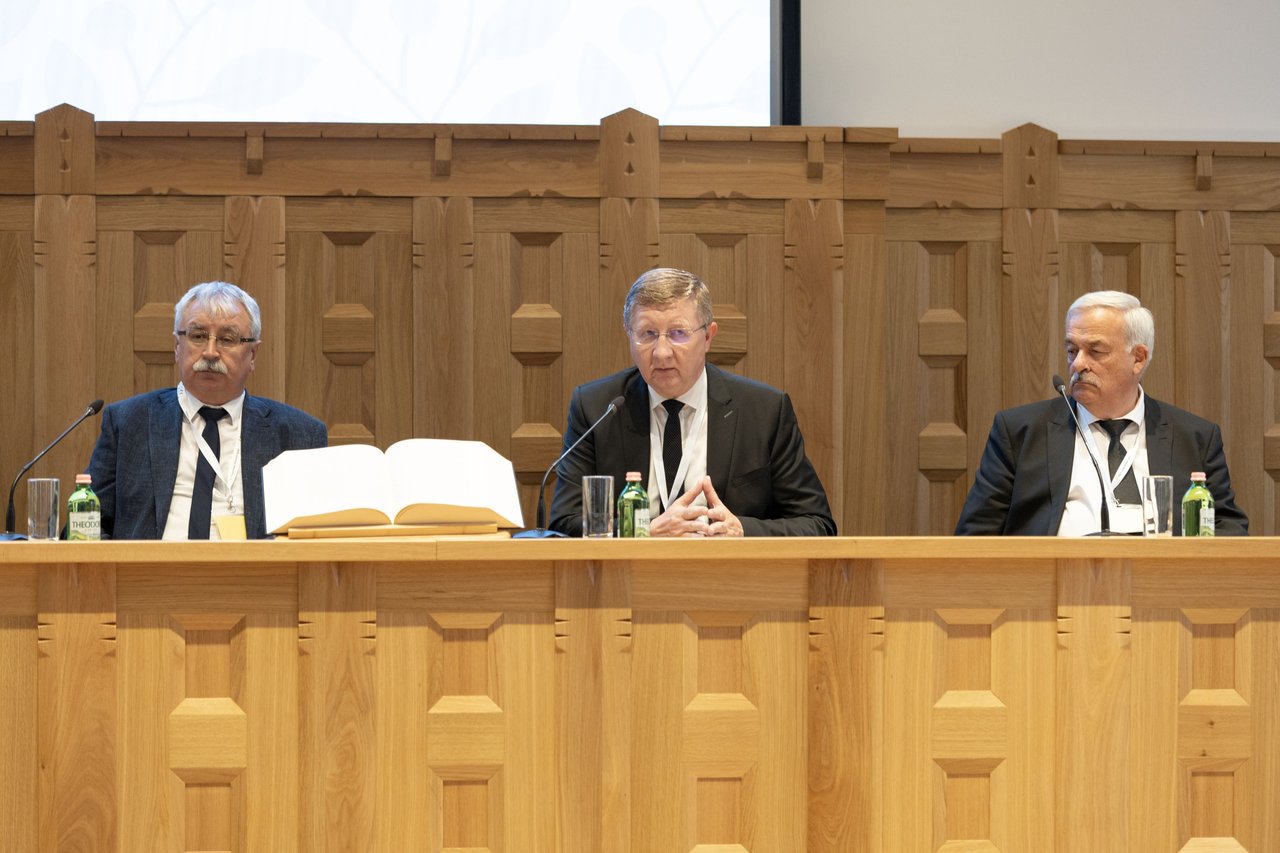
Róbert Géresi, Bishop of the Reformed Christian Church in Slovakia; Károly Fekete, Bishop of the Transtibiscan Reformed Church District; Béla Kató, Bishop of the Transylvanian Reformed Church District
A discussion of the Hungarian Reformed National Strategy for the Carpathian Basin followed the briefing on the situation in Transcarpathia. “This is part of our mission, and it is worth reiterating it repeatedly," stressed Zoltán Balog. He also said that we should not expect others to respect what is ours until we know how many of us there are, how many institutions we have, and what tools, resources, and needs we have. “If we don't hold on to what is important to us, it will be taken from us; it cannot be taken for granted anymore," he said. This is, among other things, the purpose of this national strategy. He explained that one of the most significant proposals is the creation of a spiritual and theological workshop where theologians and social scientists can articulate the kind of Hungarian people we want to address with our message today. He pointed out that the statistical annex is still missing, as we are still waiting for the census results, and the data communication within the Church is not functioning properly. Finally, following in the footsteps of his predecessor, Bishop István Bogárdi Szabó, he stressed the importance of being a blessing to those around us.
Béla Kató, Bishop of the Transylvanian Reformed Church District, said that the national strategy provides a theoretical background for the work they have been doing so far. “Any strategy is only worth as much as it is implemented," he noted.
According to Károly Fekete, Bishop of the Transtibiscan Reformed Church District, the church is at the beginning of its reflection process with this document. “The processes have started, and the work should not stop; the national strategy has generated important debates so far. At last, we have a document that wants to set a new direction. We are in a drift, and we have to respond to the impulses that are coming at us, and we have to move with the processes that are pushing us, those that drive us. Finding the time to formulate a strategy and act on it is difficult. Since the change of regime in 1989, we have only been putting out fires; we have not had time to invent ourselves," he said. We are lagging: our lethargy is also a problem because we need to be up to date. It would be good to get out of the rut and stop being slow, and we can only do that together," Bishop Fekete added.
Róbert Géresi, Bishop of the Reformed Christian Church in Slovakia, expressed his satisfaction with the discussions that accompanied the document. He recalled that the Reformed communities in Slovakia have a confession of faith, a duty, and a task that goes far beyond their population.
Finally, Bishop Zoltán Balog pointed out, based on statistics, one of the greatest dangers within the church is that pastors see themselves as being invaded by the falsehoods of the outside world and the free spirit, and pastors feel themselves to be without means to resist these phenomena. In addition, the arrogance of the majority was identified as a problem by those beyond the borders. The bishop concluded that strengthening inner spiritual and intellectual defences is a vital need that can only be achieved together.
In conclusion, the Common Synod of the Hungarian Reformed Church adopted its closing statement.
CLOSING STATEMENT OF THE COMMON SYNOD OF THE HUNGARIAN REFORMED CHURCH
We, representatives of the Hungarian Reformed Church from all corners of the Carpathian Basin and the world, at the invitation of the hosting Church, the Danubian Reformed Church District, reaffirming our covenant with God and with one another, have gathered in Budapest, in Synodal communion, by the grace of God, to give thanks, to pray for peace, and to confirm our responsibility to those entrusted to us and to the whole Hungarian nation.
Within the framework of the 2009 re-united Hungarian Reformed Church, we held the fifth joint synod of the Hungarian Reformed Churches from the world. We remember with gratitude to God that our community was able to find a home in the newly rebuilt college, the renewed Ráday House. The fire and rebirth remind us that God hears our prayers and He can turn evil into good. We have experienced this in the prayerful unity of the Hungarian Reformed world.
With thanksgiving to God, we are aware that the world communion of Hungarian Reformed Christians, represented by the Common Synod has grown with the addition of two new members. We know that "if a church community remains limited within its historical confines - and does not open towards the future, representing also the momentum of Christ's redemption - its existence will be merely archaic and not eschatological.” (National Strategy of the Reformed Church in the Carpathian Basin).
In addition to the membership reform of our community, the Hungarian Reformed Church has now embraced as associate members the two Western European diaspora umbrella organisations: the Federation of Hungarian Protestant Congregations in Western Europe and the Hungarian Reformed Pastoral Service in Western Europe.
At our synod meeting, we unanimously adopted the Hungarian Reformed National Strategy for the Carpathian Basin. Because we know that “we must strengthen the inner spiritual defenses of our church, of the Christian faith, so that we may show Christ to those entrusted to us, to those living in the Carpathian Basin, and so invite them to a life that can be fulfilled in Christ." Within this framework, we are working together to renew our pastoral training and our worship.
Together with Reformed churches around the world, we have taken action to help those who have fled Ukraine and those who remained in their home country under difficult circumstances. And in the same way, together, we raise our voices for an end to the bloodshed in Ukraine and for our Hungarian brothers and sisters living in Transcarpathia to live in peace, respecting their rights in the land of their ancestors, practising the faith and the mother tongue of their ancestors. To this end, we have organised an international consultation on the future of Ukraine with our partner churches, who have already provided substantial assistance to those in need.
"Bearing witness to our Creator, Saviour, and Comforter in our communities of the Reformed churches in the Carpathian Basin and throughout the world, is at the heart of our Christian responsibility, expressed in our manifestations and actions, both in times of opportunities and in times of inconveniences, which we pursue in a dedicated and authentic way."
We shall meet again in 2024 at the Hungarian Reformed unity day in Debrecen on May 26.
Christ is the future. Together, we follow Him!